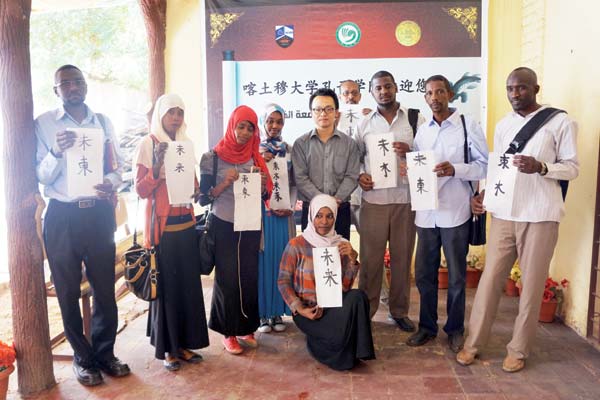 |
| Ma Pengcheng and his students at the Confucius Institute at the University of Khartoum, Sudan. Provided to China Daily |
Home to the Center for Chinese Studies, one of the longest-standing China-Africa research centers, Kotze says the Confucius Institute equipped the school to forge a platform for deeper academic ties with Chinese universities.
"It creates an environment at the university where we can develop our relationships and develop a better understanding of China," he says.
"(Confucius Institutes) assist in bringing in delegations, assist in advising on what level of engagement we should have with a specific university and help build our university's bilateral relations with Chinese institutions."
Since it was set up at Stellenbosch University, the Confucius Institute has helped the school build formal partnerships with almost a half dozen Chinese schools, beginning with Xiamen University.
By hosting a Confucius Institute, Kotze says it also helps attract Chinese students studying overseas by lending credibility to the higher education system in that region.
"The institute has helped us in creating the perception that higher education in South Africa is fine, and that it's OK for students to explore it as an option," he says.
Beyond academia, Confucius Institutes also play a big role in the surrounding communities.
Through resources Confucius Institutes provide, Stellenbosch has established a community outreach program to serve secondary schools in the surrounding areas. It sends teachers to 14 local schools for weekly language and culture lessons.
Similar programs are in place across the continent, where Confucius Institutes act as pillars of the Chinese community, spreading knowledge and understanding of the language as China becomes increasingly intertwined with Africa.
Earlier this month, six divisions of Cape Town's police force that operate in areas with a strong Chinese presence began free language classes at the University of Cape Town's Confucius Institute to help them respond to cases involving Chinese nationals.
The Confucius Institute at the University of Khartoum in Sudan is responsible for organizing more than 30 cultural events every year, each attracting hundreds of locals.
"Lots of people attend these events," says 26-year-old Ma Pengcheng, a volunteer teacher working at the Confucius Institute in the University of Khartoum.
The biggest annual event, Ma says, is the Spring Festival gala in which visiting Chinese art troupes perform, attracting more than 1,500 residents.
Ma, who has worked as a volunteer teacher in Sudan for more than two years, says showcasing China's culture is one of the biggest tasks his job entails. "My main job here is as a Chinese teacher. But I also have to be a cultural messenger," he says.
Ma, who was assigned to the post from Northwestern Normal University in Northwest China's Gansu province, says one requirement of working at a Confucius Institute is basic knowledge of traditional arts.
As volunteer positions to teach overseas become more sought after by Chinese students looking to bolster their resumes while gaining international experience, the recruitment standards set forth by the Hanban are increasingly strict.
"It's my dream job," Ma says.
"Before, not many people would want to come. But now the benefits provided by the institute are getting better. As more people want to go to a Confucius Institute, the requirements and entrance examination are becoming more and more difficult."
Basic qualifications in language instruction used to be the only requirement. But now, skills relating to Chinese culture such as tai chi or calligraphy - Ma is skilled in both - are necessary.
Expecting to sign up for a third year, Ma says it is not only a chance for him to teach Chinese but also bring knowledge from Africa to Gansu when he returns.
He says the experience he has gained will help foster better understanding between China and Africa.
We recommend:
